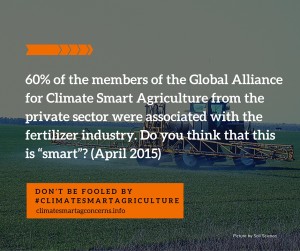 One year after the launch of the Global Alliance for Climate Smart Agriculture (GACSA), civil society restates a firm “NO” to the alliance’s concept and to its programme in a common statement, signed by over 350 organisations from all over the world, in which they express serious concern about the agenda of this alliance.
One year after the launch of the Global Alliance for Climate Smart Agriculture (GACSA), civil society restates a firm “NO” to the alliance’s concept and to its programme in a common statement, signed by over 350 organisations from all over the world, in which they express serious concern about the agenda of this alliance.
The Global Alliance for Climate Smart Agriculture (GACSA), officially launched at the UN climate summit in September 2014, has now reached nearly a hundred members, including 22 states and several private companies, and in particular also some of the biggest agro-industry corporations. The concept of “climate smart agriculture” (CSA), introduced for the first time by the FAO in 2010, is conceived as a framework to reorient agricultural systems to support development objectives and food security in the context of climate change. This concept is however strongly contested by different sides, including from the scientific community. For instance, a letter signed by 70 scholars in September 2014 openly opposed to the CSA model, promoting instead the scientific and social legitimacy of agroecology [1].
 This newly released statement is the third published by a growing alliance of civil society organizations to oppose to GACSA. The statement lists among its signatories a record of over 350 civil society groups and marks a growing opposition to the Alliance. The world’s largest peasant farmers’ movement, La Via Campesina, is among the signatories. AVSF have also signed the statement.
This newly released statement is the third published by a growing alliance of civil society organizations to oppose to GACSA. The statement lists among its signatories a record of over 350 civil society groups and marks a growing opposition to the Alliance. The world’s largest peasant farmers’ movement, La Via Campesina, is among the signatories. AVSF have also signed the statement.
Among the main critiques expressed in the statement is the fact that the definition of climate-smart agriculture is too broad and vague to be beneficial; especially as the definition leaves room for the inclusion of damaging practices. There are no criteria defining what is and is not ‘smart’. For example, agribusiness corporations that promote synthetic fertilisers, industrial meat production and large-scale industrial agriculture, all of which are widely recognised as contributing to climate change and undermining the resilience of farming systems, can and do call themselves “Climate Smart”. Furthermore, the governance structure of the GACSA is unclear, generating serious problems of accountability [2].
Read the full civil society statement: Don’t be fooled! Civil society says No to “Climate Smart Agriculture” which urges decision-makers to support agro-ecology.
